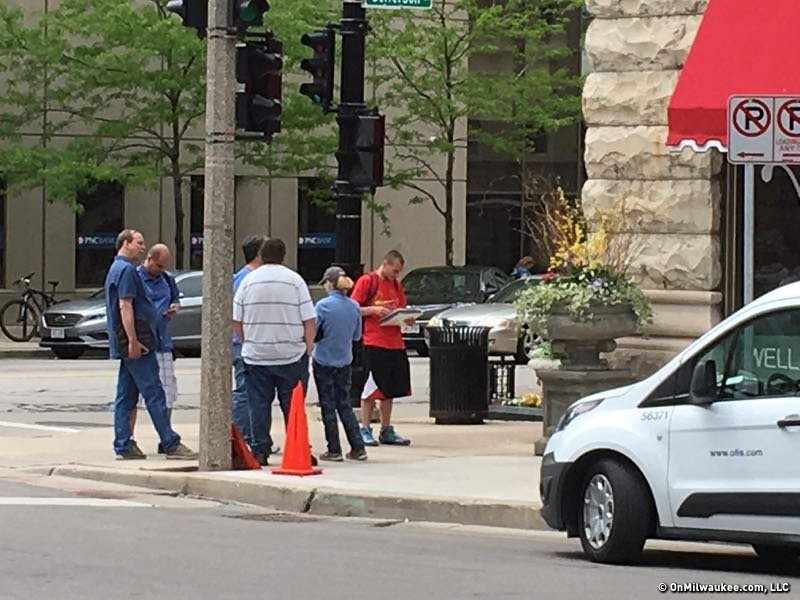Crying in public happens. Maybe we woke up, read some really bad news on Facebook, got pulled over on the way to work for a brakelight we didn’t even know was on the fritz and once at work, realized that we left our phone at home.
A pile-up of pissy events in a short period warrants at least a few public tears in the corners of our eyes, even if only our sunglasses know they’re there. And other times, we might openly weep – or even full-on bawl – in public.
That happened to me and my partner last week at Conejitos. We were sitting at the bar, waiting for our tacos, and he started reading out loud from his phone screen, first, a beautiful Facebook post our friend wrote about his mother's passing and, second, a series of Instagram posts from hip-hop artist Boots Riley (from The Coup) about his dear friend and bandmate, DJ Pam the Funkstress, who had recently passed away.
Both contained the kind of raw, honest, love-filled writing that makes you ache for the person who died and the person who was grieving and even for yourself remembering, again, that the person you love more than anything is going to die.
(OK, OK gimme a second to lighten this up.)
So there we were, having a sorrow sesh at the cantina with not even a single margarita under our belts. A few fellow diners glanced at us, but quickly looked away. I knew we were making them uncomfortable, but I didn’t care. We weren't regular public weepers, and this shit was straight-up beautiful and sad.
I later wondered why it’s socially acceptable to laugh in public, to show rage both in cars and outside of cars, but crying is often awkward and distressing? Kevin Tissot, a Licensed Professional Counselor at Lake Counseling in Shorewood, says it’s because public sadness is less common and therefore often misunderstood.
"It can seem off or crazy. In a community model we judge these people as being unbalanced and don’t seek to be around them," says Tissot.
Local psychotherapist, Ami Bedi, points out that, although it’s improving, American culture historically avoids anything that is not happy or positive and most Americans don't want to be reminded of anything that's not happy or positive.
"Some people are walking around with unaddressed sadness just below the surface, and seeing someone crying can shine too bright of a light on their own suffering and it can elicit a sense of powerlessness," says Bedi.
According to the American Psychological Association, women cry more than men, both privately and publicly, but there may be a biological reason for it. Testosterone may inhibit crying, while the hormone prolactin – of which women have higher levels – may promote it. Crying is another cultural conundrum for women – it is more acceptable for women to cry than men and yet women are often told to stop feeling sad by parents and partners and forewarned, above all, never to cry at work.
But some women give zero ducks about this.
OnMilwaukee’s Carolynn Buser and friend, Megan Simkus, had a cathartic, street-side cry after seeing the film "Landline" during the Milwaukee Film Fest last fall. They went to a cozy, nearby pub, sat outdoors, ordered some wine and proceeded to talk and shed tears throughout the evening.
"That night, in public, once we were talking about the movie and having a glass of wine, then I was able to actually cry for myself," says Simkus. "I wasn’t embarrassed. It felt good. Like a release took place. I needed it. And I was with a close friend, so it was comfortable."
During the interview, Simkus expressed her uncertainty about what to do if she notices a stranger crying in public. Should she reach out? Leave them alone? Bedi says it depends on the situation.
"There are cues that will help determine this. Distress warrants help, whereas there is a type of crying that is clearly more personal and private. If in doubt, you could gently ask if they need anything, or if there is anything you can do to help, but be sure that you are willing to assist before offering, and can do so without judgment," says Bedi.
"The bottom line is the more people are open about their emotions, the more we will become comfortable with them as a culture."
Molly Snyder started writing and publishing her work at the age 10, when her community newspaper printed her poem, "The Unicorn.” Since then, she's expanded beyond the subject of mythical creatures and written in many different mediums but, nearest and dearest to her heart, thousands of articles for OnMilwaukee.
Molly is a regular contributor to FOX6 News and numerous radio stations as well as the co-host of "Dandelions: A Podcast For Women.” She's received five Milwaukee Press Club Awards, served as the Pfister Narrator and is the Wisconsin State Fair’s Celebrity Cream Puff Eating Champion of 2019.







